

MTV Original Broadcast 8/1/1981. Saul Austerlitz. Obtusity: Speak Up! Interview With Author Saul Austerlitz. Is This the Future of the Music Video? Is this the future of music video? Alpha Beta Fox is a self-described 'dreamy shoegaze' band from Adelaide, Australia, and its latest futuristic, psychedelic video fits its music style perfectly.
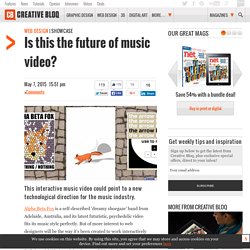
5 directors shaping the future of music videos. Chris Milk: the digital artist making music videos fly into the future. When he was six, Chris Milk borrowed his grandfather’s VHS camera and tried to recreate Michael Jackson’s Thriller video in his backyard.

Sensing the whisper of a calling, his mum sent him to summer camp at New York Institute of Tech where he learned to film music videos with other children (then played Frisbee and mini-golf all afternoon). “I was shy so I was assigned the job of holding the boom mic, he says as he sits, ghosted by jetlag and squinting in the sunshine outside the Barbican centre in London. But he felt no frustration at being kept out of the director’s chair. “I was just happy to be at the party.” Less than two decades later, Milk found himself directing the party, when Kanye West asked him to make the video for his first single, All Falls Down. But working with Kanye was a hard-won break. Forbes Welcome. Imogen Heap on blockchain technology and the future of the music industry – video. Is YouTube Bad for Music? If you’re looking for the best source of free music in the world, look no further than YouTube.
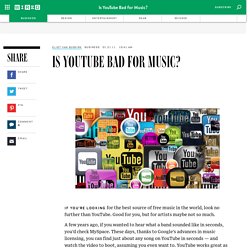
Good for you, but for artists maybe not so much. A few years ago, if you wanted to hear what a band sounded like in seconds, you’d check MySpace. These days, thanks to Google’s advances in music licensing, you can find just about any song on YouTube in seconds — and watch the video to boot, assuming you even want to. YouTube works great as an on-demand music service, and even allows users to create and share playlists.
(Tip: the high-resolution version of the videos often contains better-quality audio.) Where other ad-supported, on-demand music services have failed or been driven under by lawsuits, free music thrives on YouTube in part because it can offset licensing costs with lucrative video advertisements — and simply because it’s YouTube, and record labels cannot afford not to be there. Clearly, YouTube does a lot for the music business, fans and artists. All well and good. Go Back to Top. Forbes Welcome. How the record labels spurned the YouTube opportunity. YouTube popped up out of nowhere half a decade ago as a source of easy video hosting and sharing.
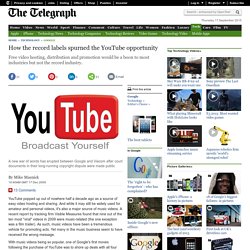
And while it may still be widely used for amateur and personal videos, it's also a major source of music videos. A recent report by tracking firm Visible Measures found that nine out of the ten most "viral" videos in 2009 were music-related (the one exception was a film trailer). As such, music videos have been a tremendous vehicle for promoting acts. Celebrating YouTube’s Influence on Music. There has been no other website that has revolutionized the Internet like YouTube.
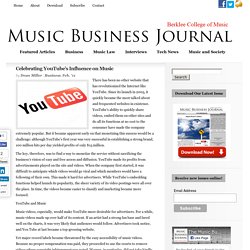
Since its launch in 2005, it quickly became the most talked about and frequented websites in existence. YouTube’s ability to quickly share videos, embed them on other sites and do all its functions at no cost to the consumer have made the company extremely popular. But it became apparent early on that monetizing this success would be a challenge: although YouTube’s first year was very successful in establishing a strong brand, 100 million hits per day yielded profits of only $15 million. The key, therefore, was to find a way to monetize the service without sacrificing the business’s vision of easy and free access and diffusion. YouTube Has Paid Out $1 Billion to Music Industry In Last Few Years. Google Inc. disclosed on Sunday that its YouTube video platform has paid out more than $1 billion to music rights holders "over the last several years," putting the California technology company among the top sources of digital revenue for the embattled music industry outside of download sales.
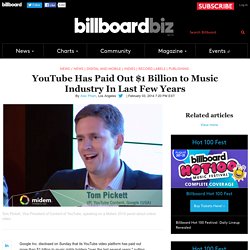
The statement, made by YouTube VP of content Tom Pickett, came in answer to a question during a panel discussion at Midem in Cannes, France, about how much value Google as a technology platform places on music and whether artists are making meaningful money by being on the platform. YouTube had earlier stated that it has paid "hundreds of millions of dollars" to the music industry. "We are very much into music," Pickett said, adding later that, "If you think about it, we’ve paid out to the music industry over the last several years over $1 billion. So there is money being generated in this ad-supported model. It is going to artists. " v12n6.pdf. Jakob Trollback: A new kind of music video. Adam Sadowsky: How to engineer a viral music video.
Amber Case: We are all cyborgs now. Our attention span is now less than that of a goldfish, Microsoft study finds - Science - News - The Independent. Microsoft surveyed 2,000 people and used electroencephalograms (EEGs) to monitor the brain activity of another 112 in the study, which sought to determine the impact that pocket-sized devices and the increased availability of digital media and information have had on our daily lives.

Among the good news in the 54-page report is that our ability to multi-task has drastically improved in the information age, but unfortunately attention spans have fallen. In 2000 the average attention span was 12 seconds, but this has now fallen to just eight. The goldfish is believed to be able to maintain a solid nine. "Canadians [who were tested] with more digital lifestyles (those who consume more media, are multi-screeners, social media enthusiasts, or earlier adopters of technology) struggle to focus in environments where prolonged attention is needed," the study reads. "While digital lifestyles decrease sustained attention overall, it’s only true in the long-term. Say it quick, say it well – the attention span of a modern internet consumer. With the rapid adoption of smart phones and tablet computers and the expansion of free Wi-Fi, hotspots, and reliable 3G we live in an always on world.

You only have to take a look around you in any public location, be it a coffee shop, supermarket, or on a commuter train to see that people are accessing the web on a constant basis. A 2011 AOP website usage study showed that a UK internet user visited 2,518 web pages across 81 domains and 53 sessions in November 2011. That's a lot of content! This is great for web based businesses as it means their audience is not only growing with each technological advance, but is also reachable 24/7. Whereas previously you may have been relying on key consumption times when people were able to be sat at their computer, now you have a consumer who you can reach with your product all through the day. The YouTube Effect - Kingston University. Shibboleth Authentication Request. The Cult of the Amateur How Blogs, MySpace, YouTube and the Rest of Today's User Generated Media are Killing Our Culture and Economy - Kingston University. Dancing in the Distraction Factory: Music Television and Popular Culture: Amazon.co.uk: Andrew Goodwin: 9780816620630: Books.
Rocking Around the Clock: Music, Television, Postmodernism and Consumer Culture: Amazon.co.uk: E. Ann Kaplan: 9780415030052: Books. Music downloading and listening: findings from the Pew Internet and American life project - Kingston University. Debate: Music video and the construction of gendered subjectivity (or how being a music video junkie turned me into a feminist) - Kingston University. Gangnam Style, Dissected: The Subversive Message Within South Korea's Music Video Sensation - Max Fisher. I imagine that the persistence of that question irritated Harry Truman above all other things.
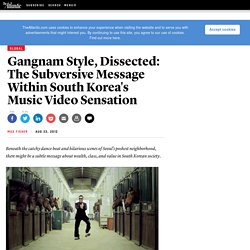
The atomic bombs that destroyed the cities of Hiroshima and Nagasaki fifty years ago were followed in a matter of days by the complete surrender of the Japanese empire and military forces, with only the barest fig leaf of a condition—an American promise not to molest the Emperor. What more could one ask from an act of war? But the two bombs each killed at least 50,000 people and perhaps as many as 100,000. Numerous attempts have been made to estimate the death toll, counting not only those who died on the first day and over the following week or two but also the thousands who died later of cancers thought to have been caused by radiation. This fiction could not stand for long.